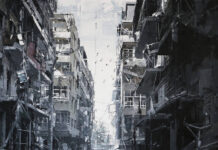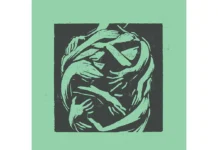It must have been already about ten years ago… A Swedish power metal act was scheduled to play at the back then Marquee stage at Graspop Metal Meeting in Belgium, it was raining heavily outside, so in order to hide from the rain, I went to check out this band, and became an instant fan. Some years later, they opened the festival on the main stage, it seemed like things were going pretty well… And it’s been going up ever since. Album after album, tour after tour. When SABATON does it, they do it well. SABATON have unleashed quite a few albums upon humanity, and they’re finally back with “The Great War”, an entire album dedicated to the history of World War I.
The 100 year anniversary of one of the world’s most tragic and cruel happenings, seemed like the right timing for the band to start writing on this sensitive topic. The band started to write on 11 November 2018: Armistice Day.
Note: I am by no means a historian, but as I’m very interested in history, and writing a review about an album covering historical events during the First World War, I’d also like to provide you with some context to the songs Sabaton are playing. Not diving very deeply into the topics, and can’t guarantee that I’m telling all these stories correctly, as I have based myself mostly on sources available online. I’d like to recommend you to listen to the history version of the album. The songs are beautifully placed in between captivating narrations, that give a better picture of the history told. The band’s YouTube channel covering the history behind their songs is also a must-watch! The videos the band so far has released about the album, are also linked during the track-by-track review.
The album is being released on 19 July 2019 through Nuclear Blast. I am not sure if the date was chosen deliberately or not, but be ready for a random fact nevertheless! 19 July 2019 marks the 100 year anniversary of the Peace Parade in London. Even though the hostilities ceased with the Armistice on 11 November 1918, the First World War did not end officially until the Treaty of Versailles was signed in June 1919. In Britain, peace was finally celebrated on 19 July that year with a Victory parade in London as the main event. Nearly 15000 British Empire servicemen took part in the parade, led by Allied commanders including Field Marshal Sir Douglas Haig and Marshal Ferdinand Foch.
“The Future of Warfare” is about one of the most horrifying inventions humankind has ever made: the tank. The rhythm and guitar riffs opening the song, almost feel as if being part of a battlefield. “The Future Of Warfare” is an energetic song, that immediately sets the grim atmosphere of the album. Bombastic, but dark.
“Seven Pillars of Wisdom,” tells the story of T.E. Lawrence. In short “Seven Pillars of Wisdom” is the autobiographical account of the experience of Lawrence, a British soldier, who was serving as a liaison officer with rebel forces during the Arabian Revolt against the Ottoman Turks of 1916 to 1918. The track feels like a SABATON classic: vocals driving the song forward, energetic guitar riffs, narrative verses, catchy choruses, and compelling solos. More than ever, these songs feel like a story.
“82nd All The Way,” tells the tale of Sergeant York, part of the 82nd Airborne Division, an airborne infantry division of the United States Army, specialized in parachute assault operations into denied areas. Their motto was “All The Way!”. The track feels like a more modern upbeat heavy metal song but certainly remains catchy.
At the beginning of July 1915, the Germans launched a full-frontal offensive on the Osowiec Fortress in Poland. Waiting for favorable wind conditions, the Germans opened the attack on 6 August with regular artillery bombardment combined with chlorine gas. The German soldiers thought they would be entering a nearly lifeless area, but instead, they met men foaming at the mouth and spitting up chunks of their own lungs. They thus retreated, after which the last standing Russian guns opened fire. This incident was called “The Attack of the Dead Men”, and is the next track in line. This song is definitely one of my personal highlights of the album. The song feels threatening, immensely dark, and has beautiful pacing. The atmosphere of the track, the orchestrations, the choirs, everything draws an accurate picture of the events happening that day, which definitely makes this track stand out for me.
Going back to 1918, a Devil Dog was a nickname for a US Marine. The Fifth Marine Regiment during Word War I arrived in a war-torn Europe. One of their most notable engagements is the Battle of Belleau Wood in June 1918, where the Marines fought the battle-hardened Germans for 26 days. As the narrator says, it almost felt if the regiment was excited to enter the conflict, and that’s exactly how this track feels. The song “Devil Dogs” feels surprisingly motivating and has epic choir sections in the choruses. The track reminds of older songs like for instance “Smoking Snakes”, and is a true SABATON classic.
“Red Baron,” tells the story of Manfred von Richthofen, also knows as The Red Baron. He was a fighter pilot with the German Air Force during World War I and is considered the ace-of-aces of the war, being officially credited with 80 air combat victories. He simultaneously embodies the mechanization of modern war and a romanticized version of war with his individual skill and heroism. “Red Baron” starts off with Fugue in D Minor by J.S. Bach, an unusual way for SABATON to start a track, and soon picks up its pace. The song almost feels like as if it’s soaring high in the sky, is energetic, has a powerful chorus, and great solos.
Passchendaele is not just a small town in Belgium, it’s a concept. It became an international symbol of the futility of the violence of war, after the Battle of Passchendaele in 1917. It was here that hundreds of thousands of soldiers perished. The title track of the album, “Great War” tells about the conflict in general. The horrors, modern techniques and tactics and the differences with other conflicts. The song instantly reminds us of classics such as “Primo Victoria”, and sure makes a great live track – especially when you take a further look at the lyrics.
As a ghost he roamed the trenches, effectively taking out his enemies one by one. He was the deadliest sniper of The Great War, with over 300 confirmed kills on his name. His name, Francis Pegahmagabow, born in an indigenous First Nations family. “A Ghost In The Trenches” talks about his life and adventures. The song itself is an epic power metal song with a lot of power and great melodies. In interviews, I read that guitarist Tommy was involved with the songwriting in this song, and it sure has some new creative elements in the track, whilst containing that SABATON DNA, the melodic neo-classical solo is one of the highlights of the album.
The first single of the album “Fields Of Verdun” was a great first taste of the album. It features the story of one of the bloodiest battles in the history of humankind, fought out on the hills in the North of France. Verdun was a tactical and symbolical city with great value to France. In 1916, the German army launched a massive attack accompanied by a tremendous artillery bombardment, upon which the French defenders put their foot down shouting “They Shall Not Pass!”. The battle was the longest single battle of the War. “Fields Of Verdun” is another one of my personal highlights, the band really managed to capture the spirit of the battlefield in this track: grim, heavy and a killer chorus.
The most epic song that SABATON has ever been written, the most progressive song in their whole repertoire might just be “The End of the War to End All Wars”. During August 1914, immediately after the outbreak of the war, British author and social commentator H. G. Wells published a number of articles in London newspapers that subsequently appeared as a book entitled “The War That Will End War”. This was later used as an idealistic name to call World War I. The track feels like an homage to everyone who has fallen during World War I, it starts off as somewhat of a ballad, but later on gains more and more power. The orchestrations and choirs make the song more of a powerful statement to really show the futility of War. Truthfully, this might be one of the only SABATON songs in their 20-year history that has made me feel emotional and even caused some tears a couple of times while I was listening to it. The vocal delivery by frontman Joakim Brodén is downright brilliant, especially the narrative-style in the verses. Everything fits in this song. I surely hope that this will be a song that they will play live during their shows to support the album.
In Flanders fields the poppies blow
In Flanders Fields by John McCrae
Between the crosses, row on row,
That mark our place; and in the sky
The larks, still bravely singing, fly
Scarce heard amid the guns below.
We are the Dead. Short days ago
We lived, felt dawn, saw sunset glow,
Loved and were loved, and now we lie
In Flanders fields.
Take up our quarrel with the foe:
To you from failing hands we throw
The torch; be yours to hold it high.
If ye break faith with us who die
We shall not sleep, though poppies grow
In Flanders fields.
“In Flanders Fields” is a war poem in the form of a rondeau, written during the First World War by Canadian physician Lieutenant-Colonel John McCrae. There was no more suitable and perfect way to end the album, like in the serenity of the rendition of this poem. Simply beautiful, lingering, melancholic and heavy.
All-in-all the album again contains some pretty standard SABATON songs, the songs remain equally strong and catchy, because why would you change your success formula? Some of the songs, however, are truly more progressive and outstanding, especially tracks like “The Attack Of The Dead Men”, “Fields Of Verdun”, and “The End of the War to End All Wars”. I couldn’t think of any other heavy metal band turning stories so horrific and grim into a powerful album while keeping the uttermost of respect towards these grim events. Definitely one of the highlights of 2019.
Tracklist
01. The Future Of Warfare
02. Seven Pillars Of Wisdom
03. 82nd All The Way
04. The Attack Of The Dead Men
05. Devil Dogs
06. The Red Baron
07. Great War
08. A Ghost In The Trenches
09. Fields Of Verdun
10. The End Of The War To End All Wars
11. In Flanders Fields
Lineup
Hannes Van Dahl – Drums
Joakim Brodén – Lead Vocals
Pär Sundström – Bass
Tommy Johansson – Lead Guitar
Chris Rörland – Lead Guitar






